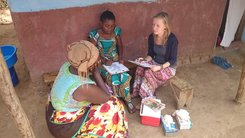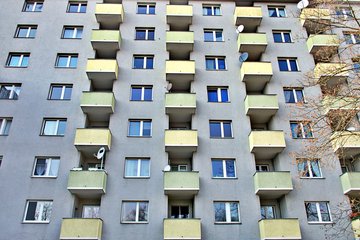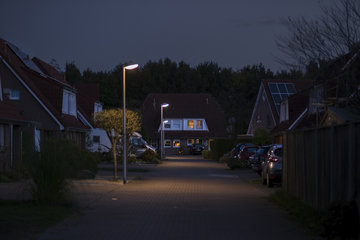Time flows very differently here
Psychologist Monika Zaba is a member of the Molecular Psychotraumatology Research Group at the Max Planck Institute of Psychiatry in Munich. As part of her doctoral studies she works in one of Uganda’s largest refugee camps.

Post from Nakivale, Uganda Africa has always been a dream of mine. I came to Uganda, where I feel very welcome – every- body wants to get to know you and get in touch with you. Here I can be free and feel at home at the same time. This is quite surprising considering that, in my research field, I am confront- ed daily with life at its cruelest – in one of Uganda’s largest refugee camps. Here, more than 80,000 people who have been driven out of their homes, who fled, were mistreated and very often suffered from sickness and starvation, seek protection and a future for themselves and their families. All who come here have experienced unimaginable violence and hardship. As part of my thesis project, I study how each individual shows different manifestations of symptoms of post-traumatic stress disorder, depression or dissociative disorders, and whether the likelihood of developing these symptoms is also apparent on a molecular level.
Another question I am trying to answer is why a large number of study participants, who have all had to endure horrific events in their lives, never developed trauma symptoms. My hope is that these results can one day be used to develop personalized treatment options for trauma patients. One of the main problems in this field is that the traditional concept of psychological disorders is heavily influenced by aspects that are specific to Western culture, where the concept was developed. As a result, there are many reasons why it can’t be readily applied in other cultural contexts where people may have, for example, a different understand-ing of these same psychological symptoms. In order to overcome these inadequacies in trauma research and therapy, we conduct in-depth in-terviews with the people living in the camp to find out more about their past and their current situation, and we also take hair and saliva samples, which are later analyzed in Germany.
Our par- ticipants come from the Democratic Republic of Congo, Rwanda and Burundi and speak a wide variety of languages and dialects. That is why one of the first challenges we often face is to explain – with the help of our interpreters and language mediators – to the participants how our research is intended to help trauma victims, and that taking samples is a completely pain-free procedure. Furthermore, taking hair and saliva samples is associated with traditions rooted in superstition. Yet as soon as we explain that sampling is completely anonymous and that we send the samples to Germany, we are able to quickly dispel any worries the participants may have and gain their trust. Shops, stores, churches, schools and bars – you could say that the refugee camp has everything you would find in any normal African city. You can tell the settlements apart, because the older ones have sturdy huts while the newer ones are still made up of tents. But the electricity supply is still not sufficient, and because our samples need to be cooled, we researchers live outside the camp. Yet many aid organizations are active on site and working tirelessly to improve the situation.
Apart from the scarcity of resources and food, another major problem for the people living here is boredom, because there isn’t enough work for everyone. Most of our interpreters and language mediators are refugees themselves, providing their services in an effort to build a future for themselves and their families. Working with us is one of the very few opportunities they have to earn money in the refugee camp. Processes of any kind take much longer over here; in fact, time flows very differently than in Europe. That is why I had to learn to adjust my research activities to the general pace of everyone around me. And sometimes I find it difficult to understand why certain things are done in a certain way. That is why it is all the more important to have a network – to get to know people who can explain to you how the world works over here, and who can introduce you to others. What’s more, everyone must take good care of themselves and make sure they don’t reach their breaking point. For that very reason, our team gets together every day after the interviews to discuss and internally process what our respective participants just told us – after all, the trauma has an effect on us as well – and then we close the case and look for activities to help us unwind and distract ourselves.
And I have also come to realize something else: Hey, you can achieve a lot even if you don’t always give 100 percent, sometimes 60 or 70 percent is just fine. Free time is a rare and precious gift here, so when you are tired, you rest. And the first question people typically ask at the start of a conversation here is just one of the many reasons I feel so welcome in Uganda: “Did you sleep well?












